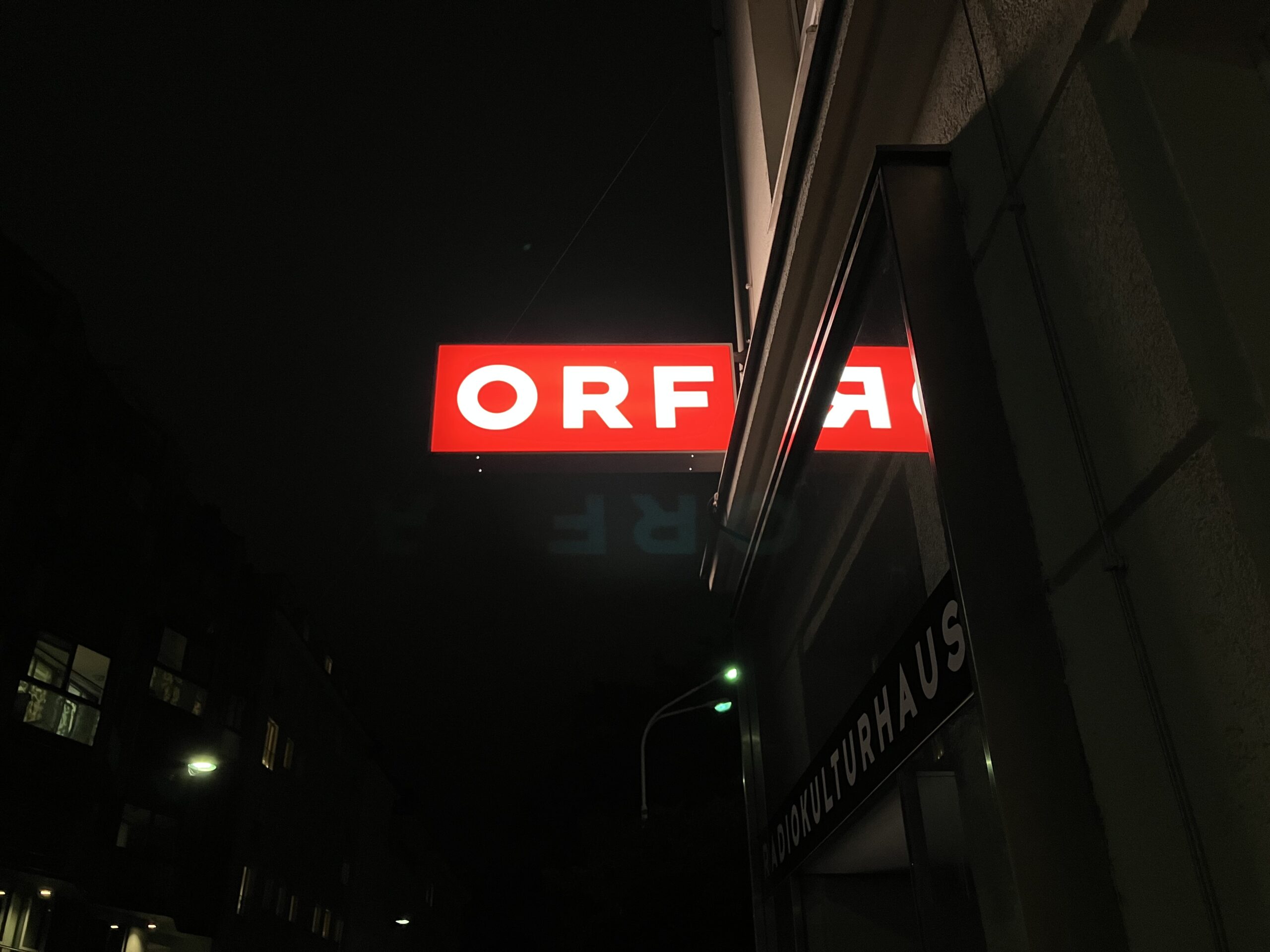ANALYSIS
ORF in the sights of the Austrian Right
5th February 2025
The future of the Austrian public broadcaster is at the centre of political negotiations, with the Blue/Black coalition planning major cuts and heavy restructure of the ORF.

IN BRIEF
- Following the election success of the far-right Freedom Party (FPÖ) in 2024, negotiations are still ongoing around the budget and mission of the public broadcaster ORF.
- The negotiations on the ORF are led by the FPÖ and the conservative Austrian People’s Party (ÖVP), both of which are historically wary of the public broadcaster.
- The FPÖ said it planned on abolishing the house levy implemented in January 2024 and revise the ORF budget downwards, while the ÖVP announced it wanted to close down one of the ORF channels.
IN FULL
It has been a turbulent start to the year for ORF, which has found itself at the centre of discussions between the two parties which won a majority in the 2024 elections as they seek to form a coalition government.
Both the far-right Freedom Party (FPÖ) and the conservative Austrian People’s Party (ÖVP) made their intentions clear towards ORF. The ÖVP asked to abolish the radio channel FM4, to merge the TV channel ORF 3 with ORF1 and for the ORF contribution to be frozen beyond 2026. The FPÖ declared it wanted to abolish the contribution altogether. Both demanded for new ORF committees to be created.
Read more: Tough start for ORF’s new house levy funding model
Negotiations on the media policy of the Blue-Black coalition began on the 18th of January and are still ongoing.
The Association of European Journalists and media experts expressed their concerns about the efforts to restrict the independence of the public broadcaster. A petition was launched, calling politics to protect the ORF.
Subscribe toour newsletter
Keep updated with the latest public
media news from around the world
Below, we explain the different ways a Blue-Black government might impact ORF:
Major cuts: With the next Austrian government facing a budget hole of €18 billion, the Blue/Black (FPÖ/ÖVP) coalition said they were planning on major public savings. the FPÖ media strategists said they wanted to change the funding system of the public broadcaster to a financing from the state budget and cut the revenue to €500 million.
Following one of the media policy negotiations sessions, it was reported that the Blue-Black coalition would impose 15% cuts at the ORF. However, it was unclear whether this would be applied to the ORF contribution paid by the Austrian public, or the total budget of the public broadcaster, which would further reduce its revenues of €165 million per year.
Such drastic cuts would mean that some of ORF’s channels, ORF 3, ORF Sport Plus and the Radio Symphony Orchestra, would not be viable anymore. According to Der Standard, it would also greatly impact the staffing of the public broadcaster, with more job cuts than what ORF first envisioned. Beyond the impact on the company itself, these major cuts would have an impact on the broadcaster’s “regionality and identity”, as it would also hit ORF’s regional stations.
Restructuring ORF: Beyond the funding cuts, the Blue-Black coalition also raised the prospect of abolishing the youth radio station FM4 and the merging of the TV channels ORF1 and ORF3. Beside these, the FPÖ also announced their intention to create a party-owned radio channel. “Anyone who wants to weaken the ORF certainly does not have the interest of the population in mind, but rather wants to get political PR messages across to the people as unfiltered as possible via the propaganda channels,” warned the .
The FPÖ’s project to start an Austria-wide party radio station is in conflict with the Private Radio Act, which prohibits political parties from broadcasting radio programmes via FM and DAB+.
Management reshuffle: The Blue-Black negotiations also concern the management of the public broadcaster. The ÖVP brought the leadership of the ORF on the agenda but the negotiators reportedly were not able to find an agreement on the composition of the ORF committees. In January, these plans consisted of creating a four-member board with a chairperson and a vice-chairperson instead of the current leadership of Roland Weißmann and the directors of the four ORF divisions.
Any incoming government also has the responsibility to decide the way that the ORF is governed. A decision of the Constitutional Court in October 2023 found that the governance of the ORF – through the Foundation Board and Audience Council – was vulnerable to political interference. The Court struck down the ORF Law until the end of March 2025, meaning a new solution is impending.
“[The FPÖ has ]deliberately stirring up sentiment against public broadcasting and reputable newspapers” – ORF’s Editorial Board
Financially starve the ORF, possible or not?
In response to the Blue/Black coalition’s plans, former head of the broadcasting regulatory authority KommAustria, Hans Peter Lehofer wrote that the 15% cuts would only be possible if the law on ORF was revised.
The media lawyer said that the ORF contribution was decided by ORF itself in accordance with its mission. “At the request of the management, the ORF Foundation Council must decide on [the ORF contribution], and the media authority KommAustria examines it”. In order to apply such heavy budget cuts, a new ORF law should be drafted, which would change – or rather restrict – the mandate of the public broadcaster.
Lehofer stressed that with this system, the ORF contribution is set by the majority in the National Council. The next governing majority would then have the possibility to review the ORF contribution.
However, the ORF must operate within the framework of the Austrian constitutional law and European law. Since the European Media Freedom Act was passed last March, public broadcasters of EU members states must ensure that “funding procedures for public service media providers are based on transparent and objective criteria.”
ORF’s rebuttal
The ORF editorial board appealed to the ÖVP to stop the plans of the FPÖ, warning that their interference would endanger ORF’s independent reporting. In a press release, the editorial board said the FPÖ was “deliberately stirring up sentiment against public broadcasting and reputable newspapers” and wanted to weaken quality critical media. The editorial board stressed how vital an independent and sustainable public broadcaster was for a democratic society. They called on civil society in Austria to preserve public broadcasting and quality media.
The media negotiator of the liberal party Neos, Henrike Brandstötter, warned that the Blue-Black media policy was a “weakening of all critical media”. She said she feared the worst from such a policy, with “the ÖVP’s hatred of the ORF colliding with the FPÖ even more seething hatred of the ORF” destroying the public broadcaster from inside out.
The “Our ORF – our democracy” petition calls on policy makers, in particular the ÖVP and FPÖ, to safeguard independent public broadcasting in Austria. The petition has received the support of Austrian and European civil society organisations and media organisations
Related Posts
4th February 2025
Funding cuts, and the threat of funding cuts | The PMA Briefing
While the BBC has announced new cuts at…
4th September 2024
Yle faces structural changes and major budget cuts
The Act on the Finnish Broadcasting…
5th December 2023
Funding cuts, freezes and reviews faced by many public broadcasters
Viable and sustainable funding for…



